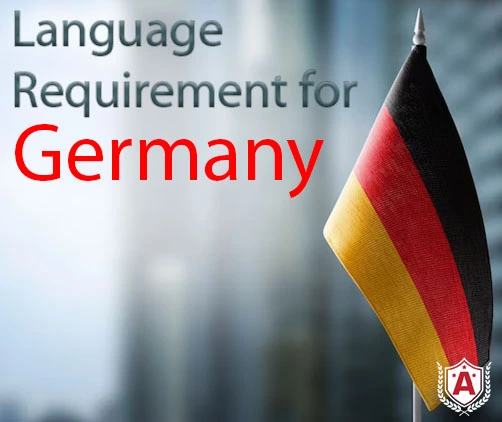Updated on May, 23 2024 06:55 IST
 Increase your German language proficiency and improve your skills in this beautiful foreign language with our German Language training! Are you planning to attend a German university for your higher education degree? Looking to hone your skills in the German language? Then all you need is the right kind of training and guidance from the best experts in this language!
Increase your German language proficiency and improve your skills in this beautiful foreign language with our German Language training! Are you planning to attend a German university for your higher education degree? Looking to hone your skills in the German language? Then all you need is the right kind of training and guidance from the best experts in this language!
Ace all those German language proficiency levels with ease with our classes!
The German language examinations are internationally recognized standardized tests that aim to evaluate the language proficiency of non-native German speakers. They are specifically designed to assess individuals' language skills at varying degrees of competency, starting from beginner to advanced levels, as categorized in A1, A2, B1, B2, C1, and C2. The A1 level represents the most basic and the C2 the most advanced level of proficiency. A1 and A2 exams assess basic language skills, like self-introduction, simple Q&A, and understanding daily expressions. These levels suit beginners in the German language. B1 and B2 exams evaluate intermediate language skills, like conversing, writing simple texts, and comprehending complex texts on familiar topics. These levels suit those who finished basic German courses and want to enhance their language proficiency. Finally, the C1/C2 exams assess high-level German skills, such as fluency, understanding complex texts, and engaging in discussions. C2 requires exceptional mastery, including fluency in complex discussions, comprehension of technical or abstract texts, and producing professional/academic work.
Want to excel in your German Language Proficiiency test? Sign up now!
If you're looking to prove your German language proficiency at an advanced level, the TestDaF exam might just be the perfect fit for you. TestDaF is designed to assess advanced German language proficiency, covering levels B2 to C1 on the CEFR scale, while Zertifikat Deutsch (ZD) measures proficiency across a range of levels, from A1 to C2, making it suitable for both beginner and advanced speakers. Whether you're a student seeking admission into a German university or a professional looking for job opportunities in a German-speaking country, the TestDaF exam can help you showcase your language proficiency and give you a competitive edge. After scoring in each area, you'll get a TestDaF level (TDN) of 3, 4, or 5, indicating your proficiency level in German to universities and employers in German-speaking countries. The TestDaF exam's standardized format and strict evaluation make it a comprehensive measure of your language proficiency and prepare you for using German in academic or professional settings.
The Zertifikat Deutsch (ZD) exam offers a comprehensive and engaging means for individuals to demonstrate their German language proficiency. With levels ranging from A1 for beginners to C2 for advanced speakers, the exam provides a thorough evaluation of language skills, validating competence in listening, reading, writing, and speaking. This outcome establishes a strong foundation for academic or professional pursuits. If you're considering studying at a German university or institution of higher education, passing the Goethe-Zertifikat C2: Großes Deutsches Sprachdiplom (GDS) test after completing the ZD exam will make you eligible, opening up doors to exciting opportunities. With the ZD exam, you can prove your proficiency in German and take your language skills to the next level. While the TestDaF exam is designed for advanced-level German speakers and assesses language skills between levels B2 to C1, the Zertifikat Deutsch (ZD) exam is divided into levels ranging from A1 for beginners to C2 for advanced speakers, providing a more comprehensive measure of language proficiency.
The German Language Tests are crucial for non-native German speakers who wish to improve their proficiency in the language. Below are four key reasons why these exams are important at each level:
A1 Level
Provides a basic understanding of the German language, including simple vocabulary and grammar.
Helps learners to communicate with native German speakers in everyday situations.
Provides a foundation for future language learning and development.
A1 certificate is often a requirement for obtaining a visa or work permit in Germany.
A2 Level
Builds on the basic language skills learned at the A1 level.
Helps learners to participate in more complex conversations and express themselves more fluently.
Provides essential language skills for individuals planning to study or work in Germany.
A2 certificate is often required for admission to certain German universities or for certain types of employment.
B1 Level
Provides intermediate language skills needed to function effectively in German-speaking environments.
Helps learners to communicate more effectively in a wide range of situations, both social and professional.
A B1 certificate is often required for admission to certain German universities and for obtaining permanent residency in Germany.
Can significantly improve employment prospects for individuals seeking work in Germany.
B2 Level
Provides advanced language skills needed for more complex academic or professional communication.
Helps learners to understand and engage with complex texts and conversations.
A B2 certificate is often required for admission to top German universities and for certain high-level professional positions.
Can significantly improve career prospects for individuals seeking work in German-speaking countries.
C1 Level
Provides mastery of the German language, allowing learners to communicate at a near-native level.
Demonstrates advanced language proficiency and the ability to understand complex texts and participate in academic or professional discussions.
A C1 certificate is often required for admission to top German universities, and for certain high-level professional positions.
Can open up many academic and professional opportunities for individuals seeking to work or study in German-speaking countries.
C2 level
It signifies an ability to comprehend and articulate complex concepts with precision and fluency
Achieving this level of competence opens up new horizons, allowing for an effortless understanding of a range of written and spoken sources
It also allows the ability to convey subtle nuances of meaning, making it an essential credential for those seeking to advance their academic or professional pursuits in German-speaking countries
Passing the C2 exam is a testament to your mastery of the German language and can provide an invaluable edge in today's competitive world.
When signing up for a German language test, it is essential to study the exact qualifying requirements since they may change based on the kind and difficulty of the exam. The requirements for taking the German language exam are as follows:
There are no strict requirements for educational or professional background for test takers of German language exams.
Anyone of any age or nationality who wants to assess their German language skills can take these examinations.
These tests are accessible to individuals of any age or nationality seeking to evaluate their German language proficiency.
Nevertheless, it is advisable that candidates possess at least 700 hours of instruction from a recognized German language program before attempting the test.
Effective communication in German necessitates a candidate's strong comprehension of German grammar, vocabulary, and pronunciation.
It is advisable to take a mock test or practice exam before attempting the actual test to assess one's readiness and identify areas that require improvement.
Candidates should also ensure that they have valid ID proof, such as a passport or national identity card, to present at the test centre.
The German language exam fees vary depending on the level and type of exam you choose. The fees for internal and external candidates are different as well. Here is a breakdown of the current fees for the different levels of German language exams:
| Level | Exam | Internal | External |
|---|---|---|---|
| A1 | Goethe-Zertifikat A1: Start Deutsch 1 | INR 5200 | INR 7600 |
| Goethe-Zertifikat A1: Fit in Deutsch 1 | INR 1400 | INR 1400 | |
| A2 | Goethe-Zertifikat A2 | INR 5200 | INR 7600 |
| Goethe-Zertifikat A2: Fit in Deutsch | INR 1400 | INR 1400 | |
| B1 | Goethe-Zertifikat B1 (für adults) | INR 12000 | INR 16400 |
| Per Module | INR 3000 | INR 4100 | |
| Goethe-Zertifikat B1 für Jugendliche | INR 4900 | INR 4900 | |
| B2.1 | Internal Class Test | NA | NA |
| B2 | Goethe-Zertifikat B2 | INR 12000 | INR 16400 |
| per Module | INR 3000 | INR 4100 | |
| C1 | Goethe-Zertifikat C1 | INR 7600 | INR 12400 |
| C2 | Goethe-Zertifikat C2: Großes Deutsches Sprachdiplom | INR 16400 | INR 20800 |
These fees may vary depending on the location and institution where the exam is taken. It is important to check with the specific testing centre to confirm the exact fees for the exam.
The A1 exam assesses basic knowledge of the German language, corresponding to the first level on the CEFR scale. Here's a quick overview of what to expect on the exam syllabus:
Main Topics
Introduction & Countries: Basic conversation about self and countries.
Numbers & Alphabet: Basic knowledge of the numbers and alphabet.
Hobbies & Work: Discussing people, hobbies, and workplaces.
Food & Drink: Conversations about food and drink.
Home & Furnishings: Basic vocabulary of living, homes, and furnishings.
Weather & Seasons: Talking about weather and seasons.
Travel & Destinations: Basic conversations about travel and destinations.
Health & Excuses: Conversations about health and making excuses.
Grammar
Personal Pronouns: Understanding personal pronouns and their usage in sentences.
Nouns & Articles: Knowledge of gendered articles and their usage in sentences.
Verbs & Negation: Understanding basic verbs and negation in simple sentences.
Prepositions: Knowledge of common prepositions of time and place.
Accusative Case: Knowledge of personal pronouns in the accusative case.
Conjunctions: Understanding basic conjunctions in sentence structures.
Adjectives: Basic knowledge of adjectives and their usage in sentences.
The A2 exam confirms elementary knowledge of the German language and corresponds to the second level (A2) on the six-level scale of the CEFR. An overview of the exam syllabus is provided below:
Main Topics
Self-introduction: Expressing yourself, your profession, and leisure activities.
Past events: Describing and narrating past events, including schooling and job experiences.
Money and wealth: Discussing financial matters and imagining what life would be like with more wealth.
Planning and travel: Talking about vacation plans, countries, nationalities, and animals.
Living and health: Discussing healthy eating habits and living environments, as well as current events related to the environment and technology.
Grammar
Verbs: Understanding and using various verb tenses and forms.
Nouns: Mastering the group of nouns and their gender, as well as indicators of time and space.
Negation: Knowing how to form negations in different contexts.
Prepositions: Knowing the correct usage of prepositions of space and time.
Casus: Understanding the different cases and their usage with different types of nouns.
The B1 exam covers understanding information on common topics in clear, standard language. Below is a summary of what you can anticipate in the exam syllabus:
Main Topics
Leisure time activities: Museums and Fine arts: exploring different activities for leisure time.
Vocations and work problems: learning vocabulary for different professions and addressing problems at the workplace.
Media and advertising: understanding the impact and history of advertising in media.
Traffic problems and means of transport: learning the appropriate vocabulary to communicate about traffic problems and means of transport.
Food, eating in restaurants and German recipes: exploring German cuisine and learning vocabulary for ordering food in restaurants.
Grammar
Past tenses: learning to use perfect, preterite, and past perfect tenses.
Modal verbs and prepositions: understanding the usage of modal verbs and their prepositions.
Indicators of time and adverbs of time: learning the appropriate vocabulary for expressing time.
Reflexive verbs and the passive voice: understanding the usage of reflexive verbs and the passive voice in German.
Adjectives and comparatives/superlatives: learning to use adjectives in comparative and superlative forms.
Genitive case and relative clauses: understanding the usage of the genitive case and relative clauses in German.
Looking to take the B2 German language exam? Here's what you can expect on the syllabus:
Main Topics
School, Training: Education and training-related discussions.
Interpersonal relations: Communication, relationships and social issues.
Living and renting: Accommodation, housing and rental issues.
Travel, trouble on vacation & complaint letters: Travel and vacation-related topics, including how to write a complaint letter.
University: Discussions and topics related to university education.
History and politics: Historical and political events, debates, and discussions.
News from all over the world: Current affairs and events from around the world.
Crime Stories: Crime-related stories and discussions.
Grammar
Declination of adjectives: Adjective declension and their usage in sentences.
Causal and effect indicators: weil, denn, deshalb, so…dass etc.: Causal and effect indicators and their appropriate usage.
The subjunctive II: politeness, unreality, the subjunctive II in the past: Proper usage of the subjunctive II in different contexts.
Subjunctive I: Indirect speech: Proper usage of the subjunctive I in indirect speech.
Subjunctive I Alternate forms: Alternate forms of the subjunctive I.
The German Language Exam C1 Exam Syllabus tests the most advanced level of German language proficiency. Below is a brief summary of what the exam syllabus entails:
Main Topics
Weather and small talk: Discussing the weather and engaging in small talk.
Languages: Discussing languages and their importance.
Luck: Expressing and understanding luck in different contexts.
Stress: Understanding and dealing with stress.
Success: sport and profession: Talking about success in sports and
The history of the division of Germany: Understanding the history of the division of Germany.
Music & Photography: Discussing music and photography.
Grammar
Past tense of verbs: Understanding and using the past tense of verbs.
Prepositions of space and of time: Understanding and using prepositions of space and time.
Two-part sentence connectives: Understanding and using two-part sentence connectives.
Expressing assumptions: Understanding and expressing assumptions.
Relative clauses: Understanding and using relative clauses.
Subjunctive I: Understanding and using subjunctive I.
The passive and alternative forms: Understanding and using the passive and alternative forms.
It's important to note that the new modular Goethe-Zertifikat C1 will replace the current exam in 2024 worldwide. Please keep this in mind while choosing a date for your exam.
Master the German language by understanding the C2 exam syllabus. This section provides a comprehensive guide to the main topics and grammar covered in the exam.
Main Topics
Communication and media: Ability to comprehend and communicate effectively through various media channels.
History and memories: Understanding of German history and its cultural significance.
Feelings, lies, strengths and weaknesses: Proficiency in discussing emotions, opinions, and personal experiences.
School time: Knowledge of the German education system and academic environment.
Career opportunities and professions: Understanding of the German job market and different professional fields.
Grammar
Tenses of the verbs: Mastery of verb tenses and their appropriate usage in different contexts.
Subjunctive II: Proficiency in using the subjunctive II form for hypothetical situations or unreal events.
Subjunctive I: Proficiency in using the subjunctive I form for expressing indirect speech or politeness.
Adverbial clauses: Mastery of adverbial clauses and their appropriate usage in different contexts.
It is crucial to have an understanding of the band score requirements for passing the German Language A1 Exam.
A1 and A2
The A1 German language proficiency exam is considered the foundational level, and achieving an overall aggregate score of 60% is necessary to pass.
However, unlike other levels, for A1, a minimum aggregate score of 60% is sufficient to pass the exam. This means that you will pass the exam as long as you score a minimum of 60% in the combined sections of Lesen, Horen, Schreiben, and Sprechen.
Your final score in the German Language A1 Exam will be determined by your performance in each section.
Scores below 60% are considered "nicht best" (not passed).
Scores between 60-69% are considered "ausreichend" (sufficient).
Scores ranging from 70-79% are rated as "befriedigend" (satisfactory).
Scores between 80-89% are rated as "gut" (good).
Finally, if you score between 90-100%, you will receive the highest rating of "sehr gut" (very good).
B1
If you're planning to take the German Language B1 exam, it's important to understand the band score system used to evaluate your performance. To pass the Deutsch Zertifikat B1 exam, you need to score at least 60% in Lesen, Horen, Schreiben, and Sprechen separately to pass the exam. This means you'll need to achieve a minimum of 135 points on the written test and 45 points on the oral test.
B2 and C1
The German Language B2 and C1 exams are widely acknowledged as dependable indicators of language proficiency for intermediate and advanced learners. Attaining a minimum of 60 points out of the maximum possible score is required to pass these exams. It is worth noting that a minimum of 45 points in the written exam and 15 points in the oral exam are prerequisites for passing.
C2
It's important to note that a module is considered passed if the candidate earns at least 60 points or 60% of the maximum score. Therefore, candidates must strive to perform well in all the sections of the exam to achieve the minimum required score and pass the module successfully.
Anigdha offers German Language Training that is unparalleled in quality. Here are some reasons why you should choose Anigdha:
Experienced Trainers: The language trainers at Anigdha are highly qualified and experienced in teaching German to beginners as well as advanced learners.
Comprehensive Course Material: The course material provided by Anigdha for German Language Training covers all aspects of language-learning including grammar rules, vocabulary building exercises, listening, and comprehension tasks, etc.
Affordable Fees Structure: Despite offering world-class training facilities with an expert team of professionals from various fields who have years’ worth of experience within their respective domains; our fee structure remains affordable.
Interactive Learning: At Anigdha, emphasis is given on interactive learning where students participate actively in discussions, debates, role-plays and other activities that enhance their speaking skills.
Personalized Approach: Each student's learning style, level of proficiency, and goals are different. Hence, we try to personalize the learning experience for all our students. This is turn results in better learning outcomes.
Flexible Timings: Anigdha understands the importance of flexibility when it comes to scheduling classes around other commitments. That is why we offer flexible slots for our training sessions so that students don’t have to compromise on the other aspects of their life.
So if you are looking to learn the German language, seek help from the most qualified individuals at Anigdha Overseas Education Consultant. And if you are looking to pursue your higher studies at a German university and need guidance and support, we have a team of eminent counselors who can walk you through the eligibility criteria, admission procedures, visa applications, scholarship shortlisting, as well as the selection of universities and programs.
We have trained more than 10,000 students willing to learn the German language!
Anigdha is the go-to destination for anyone who desires to learn the German language. Our German Language Training program has been designed with utmost care and precision, keeping in mind every learner's needs and requirements. Our trainers are experienced professionals with a deep understanding of the language and hence you can rely on them for helping you earn good score in proficiency tests.
At Anigdha, we believe that learning a new language should be an enjoyable experience that is both informative and engaging. And that is what we aim to deliver, every day, to every student! Book a free demo class today to experience firsthand how our tailored curriculum can help you achieve your language goals. Don't let language barriers hold you back - join hands with us now!
What are the different levels of the German language exam?
The German language exam has six levels ranging from A1 for beginners to C2 for advanced speakers.
What are some main topics covered in the German language exam syllabus?
The German language exam syllabus covers various topics, such as communication, history, feelings, career and professions, technical progress, environment, medicine, art, literature, and politics.
What grammar topics are covered in the German language exam syllabus?
The German exam syllabus covers various grammar topics, such as verb tenses, subjunctive, adverbial clauses, noun connectors, participles, word formation, adjectives, and prepositions.
What is the purpose of the German language exam?
The German language exam serves as a standard for assessing the German language skills of non-native speakers, with specific levels indicating various degrees of proficiency.
Can passing the German language exam help with university admission?
Yes, passing the C2 level exam, Goethe-Zertifikat C2: Großes Deutsches Sprachdiplom (GDS), makes an individual eligible to study at a German university or institution of higher education.
Get free 1-on-1 counselling with our experts

If you are looking for a new job in Germany, or if you are an expat considering ...
April, 16 2025
Are you planning to study in Germany? If so, it is important that you understand...
April, 16 2025
Are you looking to expand your education abroad and experience all that Germany ...
April, 16 2025
Germany is a popular destination for students seeking a quality education at an ...
April, 16 2025
Germany is one of the most attractive places for international students due to i...
April, 16 2025
The German language is one of the official languages of Germany so proficiency i...
April, 16 2025
There are a variety of scholarships available in Germany, from government-sponso...
April, 16 2025
This Blog post will provide important insights into student’s life. This blog ...
April, 16 2025